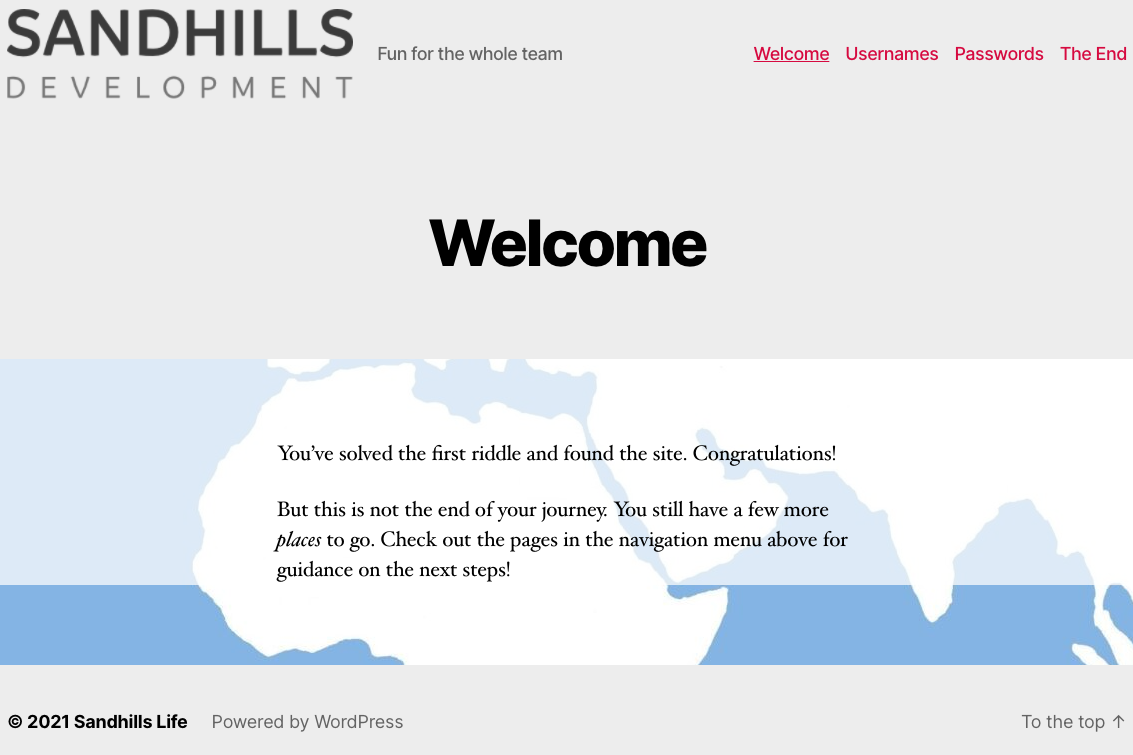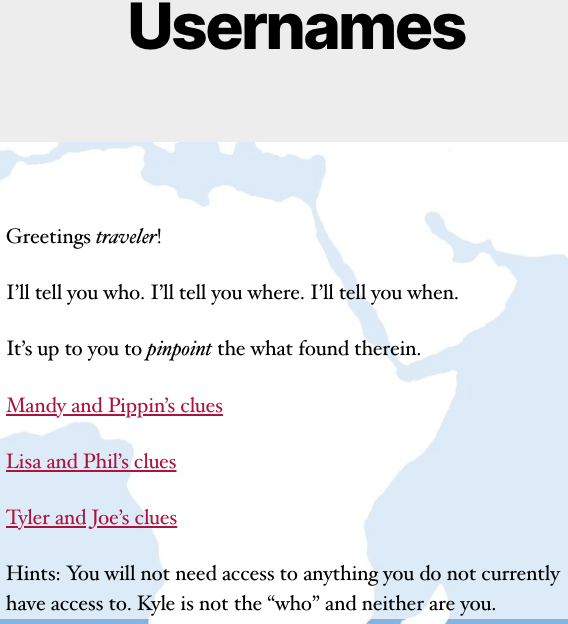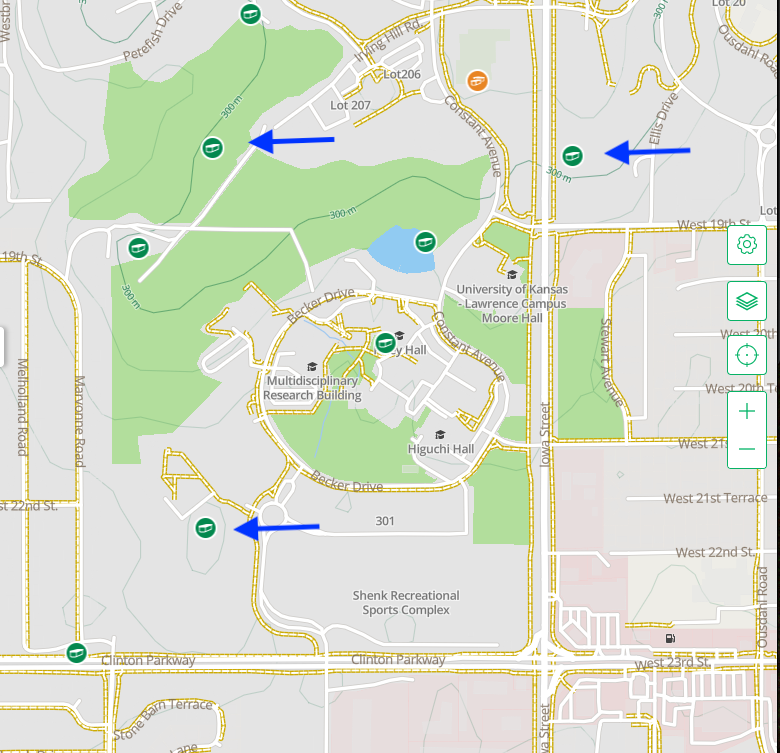I run operations at a software company called Sandhills Development and one of my responsibilities is planning our occasional team retreats. I wrote about some of them before including our 2017 All Hands and our 2019 All Hands. For the past few years our fully distributed team has been getting together in-person at least once per year. But then 2020 came along and our travel plans went out the window. When that reality became clear, we decided to start talking about having virtual team meetups for the first time ever.
When the topic was originally broached, there was plenty of skepticism. Most of us, myself included, questioned whether it was possible to put together a virtual event which was even remotely enjoyable. But it just so happens that those are the types of challenges I love. We decided to give the concept a try. Our first foray took place in June 2020 and was exclusively for our marketing team. In 2019 the marketing team gathered together in Kansas City, Missouri so this was our second meetup for the department.
Because this first virtual meetup felt to me like an opportunity to prove whether the concept was truly viable for us, I put in a little extra effort to make it as polished and engaging as possible. Perhaps on another day I’ll write about all the other things I did like the games, guest speakers, lightning talks, cooking challenges, and more. For now, I just want to share the details of a fun riddle game I threw together just for this event.
Why’d I do this?
A virtual team retreat is not a new thing and I read a ton of great ideas shared by other companies like ours’. Generally organizers like myself are looking to find creative ways to make the event feel like an actual “event” and not just a week of extra long Zoom meetings. I want participants to feel engaged and puzzles or challenges can be a great means to that end.
I’ll confess as well that in my search for inspiration I found no shortage of ideas for virtual retreat activities but I found almost none that I actually liked. The overwhelming majority felt bland, awkward, or Summer campy. Many that I encountered were cookie-cutter, simple, and just plain goofy. I encountered next to nothing that really sounded like a good fit for our team and culture. That said, some that I came across offered seeds of inspiration which I then took and made my own.
General game overview
Besides myself there were six other team members joining this meetup. I broke them up into three teams of two people each and pitted them against each other with a $25 Amazon gift card on the line for both people from the winning pair.
The challenge took place asynchronously throughout the entire week with new hints being dropped by me daily or as needed. It kicked off with a post in our shared Basecamp project in which I described the rules, teams, prizes, and also offered the initial clue. Teams were then tasked with working together in their spare time throughout the week to solve a series of custom riddles and challenges before the other two pairs.
My goal was for the challenges to require roughly an hour of collaboration time on average per day with each team hopefully being able to solve the final puzzle by the end of our meetup.
All told, I think I spent about one full work day creating this “game”.
The result
Feedback from the team was generally positive. I think everyone had fun and I was pleased that they all attacked the challenge with enthusiasm. We did have a winning team, though they didn’t solve the final riddle until a few days after the retreat had concluded.
The biggest issue with the game was that it was pretty hard. Most of the team spent more time on the challenge than I’d estimated. I got feedback from some that the puzzles were super tricky. I also had to drop more clues and hints than I’d expected.
In spite of that, I think it went pretty well. I’d do it again in the future for sure. Creating it was a lot of fun for me and I think I could do it even better next time.
The full game details
This is definitely not a challenge one could copy/paste exactly into another team’s event. However, since I couldn’t find any others doing challenges quite like this in my research, I’ll offer all the details just in case they prove inspiring for others like me.
Here’s how it works!
In order to win the game, the winning team must successfully login to a specific website. Once they have logged in, they are done. If they do that before the other two teams, they win.
In order to accomplish that goal, the teams need three things which are the basis for three challenges:
- The URL of the website
- The unique username for their team
- The unique password for their team’s account
That’s it. You win if you figure out the URL of the site as well as your team’s credentials. Hacking the site was prohibited, of course.
To bring this to life, I did the following:
- Bought a domain
- Setup a new hosting account
- Created a WordPress site
- Created a user account for each of the three teams
- Installed a few plugins to handle the user login, redirection, and event tracking so I could get timestamps for every failed and successful login attempt
I also ran multiple simulations of the entire challenge as well to ensure it worked and was solvable. The first time I had my wife read all the clues and tell me her guesses for an initial outside perspective. Next I asked two colleagues who would not be participating in the meetup to jump on a Zoom call and do their best to solve the whole thing.
The simulations were incredibly helpful. Being able to watch and listen as people described their thought processes and attempted to crack some of the puzzles helped shine a bright light on any assumptions I’d made and hint at whether my difficulty level was appropriate.
Now on to the actual riddles…
Puzzle #1: The URL
After explaining all the parameters in detail, I shared the first riddle with my colleagues which was as follows:
You’ll find the address in the beginning of the end
My most recent ten are what I’d recommend
Solution
Solving this without being an employee at Sandhills would be almost impossible and it proved difficult even for those who do work here. This is because it hints at a daily ritual we have in which all of us post a reply to a check-in in Basecamp prompting us to “Tell us ONE thing you worked on today”.
The “beginning” refers to the first letter, the “end” refers to the daily check-in which prompts us at the end of our work days. “My most recent ten” points to the previous ten check-ins I responded to.
What I did was make sure that the ten check-ins immediately preceding the meetup began with a very specific letter each time. In the end they looked like this:
- Spent some time chatting with Chris today at length which turned out to be really helpful. He helped me see an important blind spot and work through some challenges.
- Had a pretty quiet, focused day which was great. Writing a long Basecamp update post. Apologies in advance to the few who will eventually have to read it. It’s long…
- Decided to place my trust in Tyler with regards to some important meal planning.
- Designed what I hope will be a more clear, easy to follow, marketing meetup agenda and submitted my first draft to Lisa for feedback.
- Ordered some swag for some deserving peeps!
- Talked with Drew about some project management stuff. Really interesting discussion.
- Lots of small tweaks to the marketing meetup agenda which I think is just about done.
- I booked a guest speaker for our virtual marketing meetup next week 📢
- Five different employees needed changes to their Sipscriptions so I got those all done today.
- Entered a bunch of data into a spreadsheet I’m prepping for next week’s marketing discussions.
If you piece the first letters together in order you get “SHDDOTLIFE” which eventually lead everyone to shd.life where they could proceed to the second challenge…
Puzzle #2: The username
The home page of the site looked like this:

The site contained four main pages:
- The home page
- A page with the username riddles
- A page with the password riddles
- A page with a login form
Teams could work on the passwords or username riddles at the same time or in any order if they wanted but for a couple reasons, starting with usernames was the better choice and I think everyone did.
The usernames page looked like this:

For this challenge, I created separate riddles for each team since they each had different answers (usernames) to find. They all followed the same general theme (places) though I didn’t explicitly tell anyone that was part of the game. I think some savvy players caught on that all the answers were places after observing my rudimentary styling of the site and my italicized words throughout but it wasn’t essential to pick up on it.
Team 1’s riddle
Hello Pippin and Mandy. My first name makes a phonetic appearance within the name of a popular fruit. I wrote the word you seek in a query I tossed on a piece penned by one of you. I did this the day after a day of a particular color.
- Miss super random
Solution
The answer to this riddle was the word “greece” which appeared in a comment that a reader named Anna left the day after Black Friday on a blog post which Mandy wrote.
Team 2’s riddle
Hello Phil and Lisa. The day on which blonde brownies are officially recognized as worthy of celebrating is the day that I hit one of you up for some cash and mentioned the word you seek. You graciously obliged the following day.
- Someone happy, not mads
Solution
This riddle’s answer was the word “peru” which was mentioned by a customer named Mads in a support ticket they submitted on January 22nd in which they asked for a refund. Phil granted the customer’s request the next day.
Team 3’s riddle
Hi Tyler and Joe. We’ve never met (yet). But two weeks after you both were on track with each other, I dropped this status update which includes the word you seek. Hours later, we found ourselves face-to-face.
- Thrice tried, thrice denied
Solution
This one was really tricky. The answer was the word “malaysia” which a colleague of ours included in a Basecamp status update. This coworker lives in another country and these players have not yet met him in person. The “on track” reference hints at the time these two players found themselves go kart racing together at a team meetup and “face-to-face” means on an All Hands Zoom call we all participated in hours after the status update in question. There are some more subtle hints in their too which only these participants would get.
Most of the players ended up figuring out that, since the site was made using WordPress, they could go to the login form and confirm whether the username was correct by attempting to login using it. WordPress by default returns a “no such username exists” error if the username is bogus and a “password incorrect” message if the username is legit but not the password.
Puzzle #3: Passwords
The final challenge was the most interesting. I wanted really badly to figure out a way for there to be a component of this challenge which took participants away from their desks. After entertaining many ideas, I ended up incorporating a Geocaching exercise. For those who’ve never played, Geocaching is a global scavenger hunt activity with a huge community of players. It’s been around a long time now and I played one time like 15 years ago. It works by using GPS and written clues to guide players to real-life hidden artifacts which can then be marked as found (or not).
Geocaching exists virtually everywhere so I was able to browse all the caches hidden in neighborhoods near my participating colleagues. Then I instructed players to create a Geocaching account, add me as a friend, and refer to a big list of 18 different caches. Within the list were three local caches for each player, they just needed to browse the ones local to them and compare it to the list I had on the Passwords page to figure out which three were their’s.
Then they need to go out of their home and physically find those three caches. I’d be able to see on their profiles when they’d successfully marked all of those caches as “found”. Once both members of a team had found their caches, I gave them the final clue.
The requirement to leave home was artificially enforced by me. Technically the caches didn’t contribute anything to the puzzles. The end solution could have been gleaned without visiting the physical places in-person, I just wanted to require that and I’m glad I did. Everyone had fun Geocaching in their neighborhood.
I did briefly entertain a next-level addition to the challenge in which I secretly worked with each participant’s significant-other to hide meaningful clues along with the real caches. That would have made it impossible to solve the puzzles without finding the caches and would have just been super surprising and cool but ultimately it was too much work with too many points of failure for me to try. I could see a simpler version of the concept working where I contact members of everyone’s households secretly to get some clue hidden in their home. Maybe I’ll try that next time. But back to the passwords challenge…
Once teams had found their caches, I shared the final clue:
The map of places you’ve just been
is where the answer lies
Look again at every pin
This time without your eyes
Solution
This one was really hard and I had to drop a few more hints before anyone got it. Here’s how it works:
Each player found three caches. They then needed to look at a map with those three points marked. The caches I chose aligned so that they would form a shape. The shape is a letter in Braille, hence the “without your eyes” reference. For example, one player’s caches looked like this:

Each team would end up with two letters. If they combined those two letters it would be an abbreviation of a US state. For example, if their letters were C and O, the answer was Colorado. This state name was their password and once they had it, they could login to the site successfully.
That’s pretty much it. It’s possible I had more fun making this challenge than my colleagues had playing it but I think it was enjoyable enough to try again some other day. I loved trying to think of riddles which were highly personalized and could only be solved by the people playing.
I’m still learning and looking for more creative ways to make virtual retreats compelling. If you have ideas, definitely please share in the comments.
